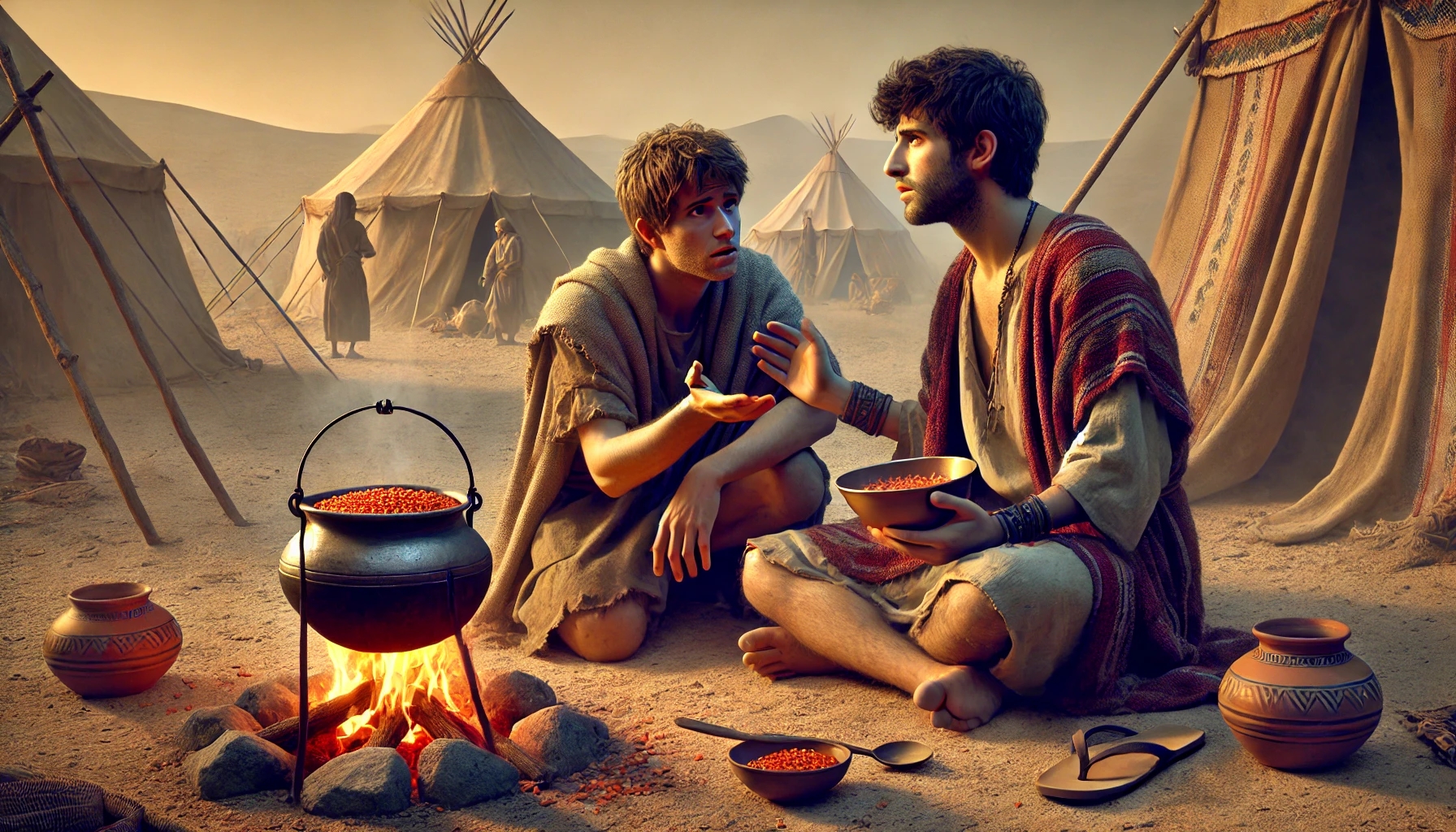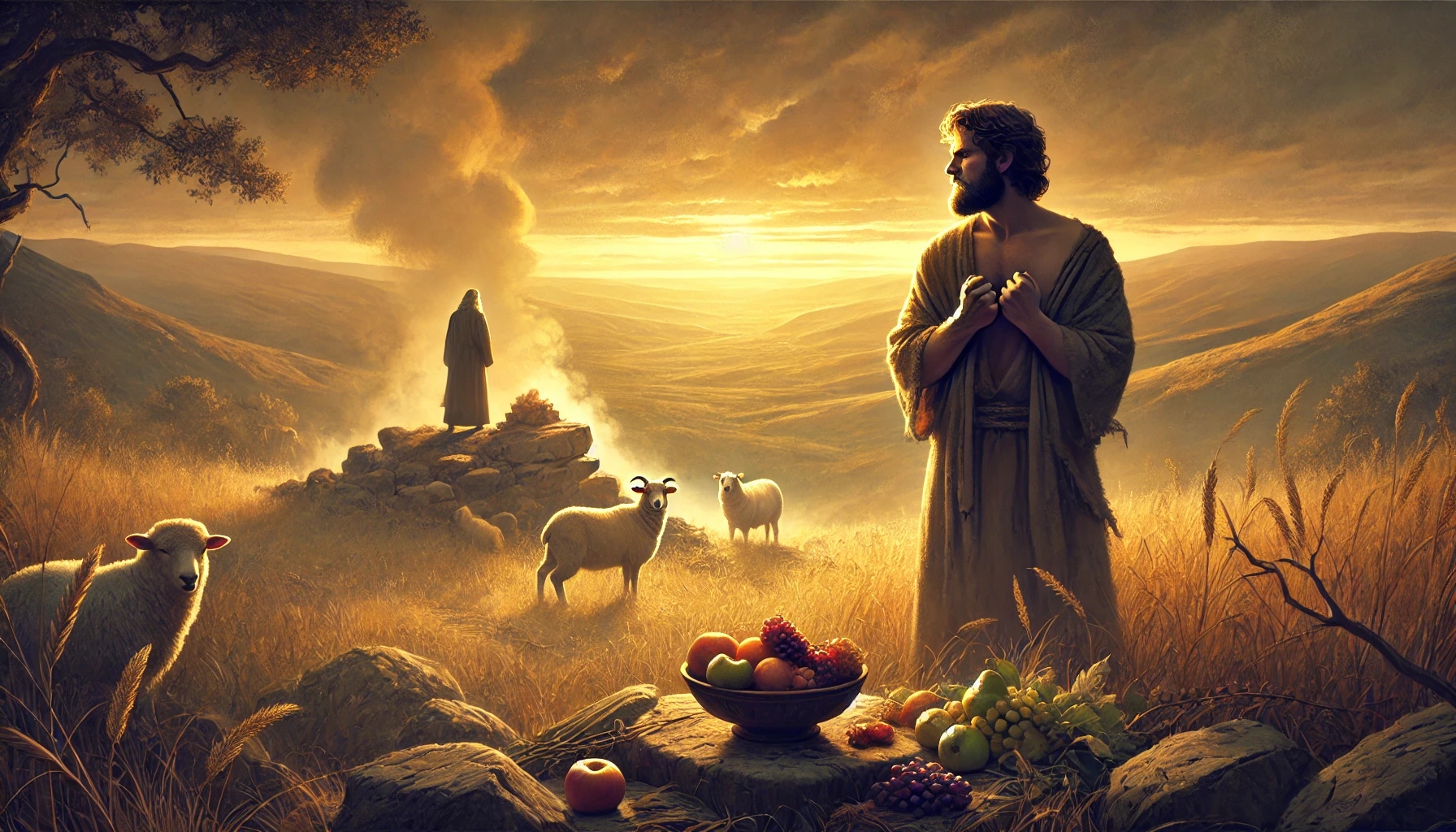11.05.2025 – Genesis Chapter 25 | BELIEVE HIS PROPHETS

📅 May 11, 2025
📖 DAILY BIBLE READING
✨ Genesis 25 – From Abraham’s Death to the Conflict between Esau and Jacob
══════════════════════════════════════════════
📜 Bible Text – Genesis 25 (KJV)
1 Then again Abraham took a wife, and her name was Keturah.
2 And she bare him Zimran, and Jokshan, and Medan, and Midian, and Ishbak, and Shuah.
3 And Jokshan begat Sheba, and Dedan. And the sons of Dedan were Asshurim, and Letushim, and Leummim.
4 And the sons of Midian; Ephah, and Epher, and Hanoch, and Abidah, and Eldaah. All these were the children of Keturah.
5 And Abraham gave all that he had unto Isaac.
6 But unto the sons of the concubines, which Abraham had, Abraham gave gifts, and sent them away from Isaac his son, while he yet lived, eastward, unto the east country.
7 And these are the days of the years of Abraham’s life which he lived, an hundred threescore and fifteen years.
8 Then Abraham gave up the ghost, and died in a good old age, an old man, and full of years; and was gathered to his people.
9 And his sons Isaac and Ishmael buried him in the cave of Machpelah, in the field of Ephron the son of Zohar the Hittite, which is before Mamre;
10 The field which Abraham purchased of the sons of Heth: there was Abraham buried, and Sarah his wife.
11 And it came to pass after the death of Abraham, that God blessed his son Isaac; and Isaac dwelt by the well Lahairoi.
12 Now these are the generations of Ishmael, Abraham’s son, whom Hagar the Egyptian, Sarah’s handmaid, bare unto Abraham:
13 And these are the names of the sons of Ishmael, by their names, according to their generations: the firstborn of Ishmael, Nebajoth; and Kedar, and Adbeel, and Mibsam,
14 And Mishma, and Dumah, and Massa,
15 Hadar, and Tema, Jetur, Naphish, and Kedemah:
16 These are the sons of Ishmael, and these are their names, by their towns, and by their castles; twelve princes according to their nations.
17 And these are the years of the life of Ishmael, an hundred and thirty and seven years: and he gave up the ghost and died; and was gathered unto his people.
18 And they dwelt from Havilah unto Shur, that is before Egypt, as thou goest toward Assyria: and he died in the presence of all his brethren.
19 And these are the generations of Isaac, Abraham’s son: Abraham begat Isaac:
20 And Isaac was forty years old when he took Rebekah to wife, the daughter of Bethuel the Syrian of Padanaram, the sister to Laban the Syrian.
21 And Isaac intreated the Lord for his wife, because she was barren: and the Lord was intreated of him, and Rebekah his wife conceived.
22 And the children struggled together within her; and she said, If it be so, why am I thus? And she went to enquire of the Lord.
23 And the Lord said unto her, Two nations are in thy womb, and two manner of people shall be separated from thy bowels; and the one people shall be stronger than the other people; and the elder shall serve the younger.
24 And when her days to be delivered were fulfilled, behold, there were twins in her womb.
25 And the first came out red, all over like an hairy garment; and they called his name Esau.
26 And after that came his brother out, and his hand took hold on Esau’s heel; and his name was called Jacob: and Isaac was threescore years old when she bare them.
27 And the boys grew: and Esau was a cunning hunter, a man of the field; and Jacob was a plain man, dwelling in tents.
28 And Isaac loved Esau, because he did eat of his venison: but Rebekah loved Jacob.
29 And Jacob sod pottage: and Esau came from the field, and he was faint:
30 And Esau said to Jacob, Feed me, I pray thee, with that same red pottage; for I am faint: therefore was his name called Edom.
31 And Jacob said, Sell me this day thy birthright.
32 And Esau said, Behold, I am at the point to die: and what profit shall this birthright do to me?
33 And Jacob said, Swear to me this day; and he sware unto him: and he sold his birthright unto Jacob.
34 Then Jacob gave Esau bread and pottage of lentiles; and he did eat and drink, and rose up, and went his way: thus Esau despised his birthright.
══════════════════════════════════════════════
🟦 Introduction
This chapter marks a transition in the Genesis narrative. Abraham dies, Isaac becomes the bearer of God’s blessing, Ishmael’s descendants are named, and two new central figures emerge in Esau and Jacob. Most dramatic is the scene where Esau sells his birthright for a bowl of lentil stew—a symbol of despising spiritual blessings in favor of earthly needs.
══════════════════════════════════════════════
🟨 Commentary
1. Abraham’s Final Years (vv. 1–6)
-
Abraham takes another wife, Keturah, and has more children.
-
Crucially, he gives his entire inheritance to Isaac—affirming God’s covenant.
-
The children of the concubines receive gifts and are sent away—symbolizing the separation of the covenant line.
2. Abraham’s Death and Burial (vv. 7–11)
-
Abraham dies at a “ripe old age,” a life fully lived under God’s guidance.
-
Isaac and Ishmael, half-brothers, bury him together—a moment of unity.
3. Ishmael’s Descendants (vv. 12–18)
-
Twelve princes descend from Ishmael, fulfilling God’s promise to Hagar (Gen 16:10).
-
Ishmael dies aged 137; his line continues independently of the covenant line.
4. Isaac’s Story Begins (vv. 19–21)
-
Isaac prays for Rebekah because she is barren—an example of faith in action.
-
God answers, and Rebekah conceives.
5. The Birth of Esau and Jacob (vv. 22–26)
-
Even in the womb the twins struggle, foreshadowing that “the elder will serve the younger.”
-
Esau is born first, red and hairy; Jacob follows, grasping Esau’s heel—symbolic of their future rivalry.
6. Contrasting Characters (vv. 27–28)
-
Esau grows up a skillful hunter, impulsive and outdoorsy.
-
Jacob is quiet, home-oriented, and strategic.
-
Isaac favors Esau, Rebekah favors Jacob—planting seeds of family tension.
7. The Sale of the Birthright (vv. 29–34)
-
Esau, famished from the field, begs Jacob for stew.
-
Jacob seizes the moment: “Sell me your birthright.”
-
Esau despises his spiritual inheritance and trades it for a single meal.
══════════════════════════════════════════════
🟩 Summary
Genesis 25 sets the stage for the rest of Scripture:
-
Abraham’s death passes the blessing to Isaac.
-
Ishmael’s line branches off.
-
The birth of Esau and Jacob introduces prophetic tension.
-
Esau’s disdain for his birthright underscores the theme of valuing spiritual blessings.
══════════════════════════════════════════════
🟥 Message for Today
-
God’s purposes span generations, despite human failings.
-
Spiritual gifts and callings must be cherished—not casually exchanged.
-
Prayer is powerful: like Isaac’s intercession for Rebekah, we can pray with expectation.
-
Family relationships require care to prevent destructive rivalries.
-
Character matters: Jacob’s hunger for God’s blessing, though imperfect, was decisive.
“Do not despise your birthright.” – Value faithfully what God has entrusted to you.
~~~~~ 📚 ~~~~~

📆 May 11–17, 2025
📆 WEEKLY SPIRIT OF PROPHECY READING
📖 Ellen G. White │ Patriarchs and Prophets – Chapter 5
✨ Cain and Abel Tested
📖 Read online here
══════════════════════════════════════════════
🟦 Introduction
The story of Cain and Abel is more than an account of the first murder. It’s a portrait of two fundamentally different attitudes toward God—faith versus self-righteousness, obedience to one’s own works. In their contrast we see the two great camps that will persist throughout salvation history: those who accept God’s way of redemption through the blood of Jesus—and those who think they can come to God without sacrifice, humility, or a Savior. The tragic escalation between the brothers reveals the consequences of a religion without heart, without grace, and without genuine repentance.
══════════════════════════════════════════════
🟨 Commentary
- Two Brothers, Two Hearts – Cain’s Pride, Abel’s Faith
Abel saw God’s law as grace and order, offering an animal sacrifice in faith for redemption. Cain treated sacrifice as mere duty, refused the blood offering, and sought approval through his own works. - The Difference in the Offering—and in the Attitude
Both built altars and offered gifts. But God looked at the heart: Abel’s offering was accepted—through faith (Heb. 11:4); Cain’s was rejected—for unbelief and rebellion. Cain rejected God’s way and tried to justify himself by performance. - Faith Shows Itself in Obedience
Cain’s offering was externally correct but internally empty. True worship requires obedience born of faith, subordinating us to God’s will. Abel recognized his sin and need for atonement—Cain did not. - God’s Warning and Cain’s Rejection
God speaks kindly to Cain, warning him of sin (Gen. 4:6–7). Cain refuses to submit and allows jealousy and anger to grow. The brother who shames him by obedience becomes his enemy. - The Murder of Abel—and the Spiritual Line
Cain kills Abel—not in self-defense, but out of hatred for his righteousness. This is the first act of spiritual persecution: the righteous pursued by the unrighteous—a pattern repeated through history. Abel dies as a witness of faith—his testimony still speaks (Heb. 11:4). - God’s Judgment and Mercy
Cain is held accountable: he lies and shows no remorse. God’s judgment follows—cursed ground, restless wandering, exile. Yet God does not destroy him; He gives him a chance to repent, which Cain never takes. - Cain as Father of Rebellion
Unrepentant, Cain becomes the progenitor of a godless culture. His example shapes generations—up to the Flood. God’s decision not to slay the first murderer at once shows the full scope of human defiance. - The Great Conflict—Until the End of Time
Cain and Abel exemplify two spiritual camps: those who trust in Christ’s blood and those who think they can save themselves. This chapter foreshadows the cosmic struggle between light and darkness, truth and error, grace and lawlessness. The story repeats in new forms until Christ returns.
══════════════════════════════════════════════
🟩 Summary
Cain and Abel are two brothers of the same origin but with completely different paths. Abel brings the sacrifice God demands and is counted righteous by faith; Cain rejects God’s instructions and, in envy, kills his brother. Their story mirrors humanity: two modes of worship, two attitudes toward God’s Word—and two very different outcomes. Abel’s blood calls for justice; Cain’s rebellion brings God’s judgment. Yet throughout, God’s patience and mercy remain visible—even toward the murderer.
══════════════════════════════════════════════
🟥 Message for Us Today
- True faith produces obedience. Faith without obedience is dead. Abel obeyed and was justified—this remains true.
- We cannot impress God by our works. Those who come without Christ’s blood are rejected like Cain—not for lack of effort, but out of pride.
- God’s way is non-negotiable. He has ordained the path of redemption through Jesus’ blood. Any attempt to bypass it leads to ruin.
- God’s warnings are an expression of love. Cain was warned. Today God still calls sinners to repentance before judgment falls.
- Faith is a choice. Abel and Cain faced the same truth—only one embraced it. Faith is not accidental but obedience in trust.
- The conflict between light and darkness endures. Followers of Christ will face rejection, resistance, even hatred. But like Abel, we can know: God sees, God remembers, and God will bring justice.




















